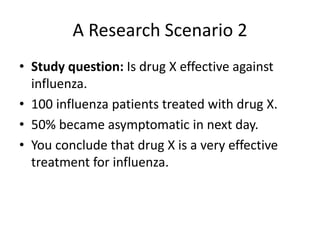Formulation of study question RSS6 2014
- 1. Formulation of Study Question Amr Albanna, MD, MSc
- 2. Objectives 1. To understand the difference between “background” and “foreground” questions. 2. To have a systematic way for searching and presenting background information related to your research topic. 3. To be able to formulate a PICO (or PICOT) format question. 4. To understand the importance of formulating a good study question for planning your research study.
- 3. How are these questions different? • Do statins improve survival after acute myocardial infarction? • In patients with first acute myocardial infarction, does early administration of statins lead to higher survival rates as compared to placebo?
- 4. How are these questions different? • Does watching TV cause obesity? • In school children, is increased TV viewing associated with an increased incidence of obesity measured using body mass index?
- 5. How are these questions different? • How does polymerase chain reaction (PCR) work? • In patients suspected to have pulmonary tuberculosis, is PCR more sensitive and specific than culture?
- 6. Types of Questions Guyatt et al. Users Guides to the Medical Literature. Chicago: AMA Press, 2002
- 7. Background questions • General (broad) question • Resources: – Textbooks – Narrative reviews (Opinion articles)
- 8. Background 1. The overall burden of health-care related disorder/issue (current situation). 2. Specific problems related to this disorder (e.g. diagnosis, associated problems, complications, treatment). 3. Unanswered questions. Justification of conducting research study 4. Formulation of study question.
- 9. Foreground Question • Focused question about specific problem. • Resources: – Primary (original) research. – Secondary research such as “systematic review”.
- 10. What type of question?
- 11. What type of question?
- 12. Focused search
- 13. Good study question 1. Related to the problem. 2. Facilitate searching for a precise answer.
- 14. PICO format P Patient or problem being addressed. I Intervention or exposure being considered. C Comparison, when relevant. O Outcome of interest.
- 15. Stillwell et al. AJN March 2010 Vol. 110, No. 3
- 16. Architecture of a focused question: a 4-part review question • Patient: – Disease or condition – Stage, Severity – Demographic characteristics (age, gender, etc.) • Intervention: – Type of intervention or exposure – Dose, duration, timing, route, etc.
- 17. Architecture of a focused question: a 4-part review question • Comparison: – Absence of risk or treatment – Placebo or alternative therapy • Outcome: – Risk or protective – Dichotomous or continuous – Type: mortality, morbidity, quality of life, etc. • Time period (PICOT)
- 18. Formulation of a therapy question Is Zinc effective in treating cold? In children with common cold, is oral Zinc effective in reducing the duration of symptoms, as compared to placebo? Intervention Outcome InterventionPatient/problem Outcome Comparison
- 19. Formulation of an etiology question Is smoking a risk factor for tuberculosis? Are people who smoke regularly at a greater risk of developing pulmonary tuberculosis as compared to those who do not smoke? Exposure Outcome ExposurePatient Outcome Comparison
- 20. Formulation of a diagnosis question Is Positron Emission Tomography (PET) a good test for coronary disease? Is PET a more sensitive and specific test in diagnosing coronary artery disease as compared to coronary angiography? Test (intervention) Outcome PatientOutcome Comparison Test (intervention)
- 21. How a focused question helps in searching for studies Patient or Problem Intervention & comparison Outcome PICO Studies most likely to address the question
- 22. Case Scenario • 6 years old boy, who has been having recurrent ear infection, presents with fever and right ear pain. The mother expresses concerns because her child has been on Amoxicillin for the past few weeks.
- 23. Questions – Among children, how common is ear infection? – Is Amoxicillin effective? – Is there any better treatment? – What is the consequence (harm) of long-term antibiotic use? – What is the outcome of recurrent ear infection?
- 24. Case Scenario • How to formulate a research study question related to this scenario?
- 25. Once a review question is defined • Search the literature and see if a similar study has been done already! • If a similar study has been done, see if there some way you can improve on it • If a high-quality research study already exists, consider an alternative question!
- 26. Stillwell et al. AJN March 2010 Vol. 110, No. 3
- 27. A Research Scenario 1 • Study question: Does eating affect student intellectual ability. • 100 students underwent an exam after eating lunch. • 50% failed the exam. • You conclude that eating worsen students intellectual ability.
- 28. A Research Scenario 2 • Study question: Is drug X effective against influenza. • 100 influenza patients treated with drug X. • 50% became asymptomatic in next day. • You conclude that drug X is a very effective treatment for influenza.



























